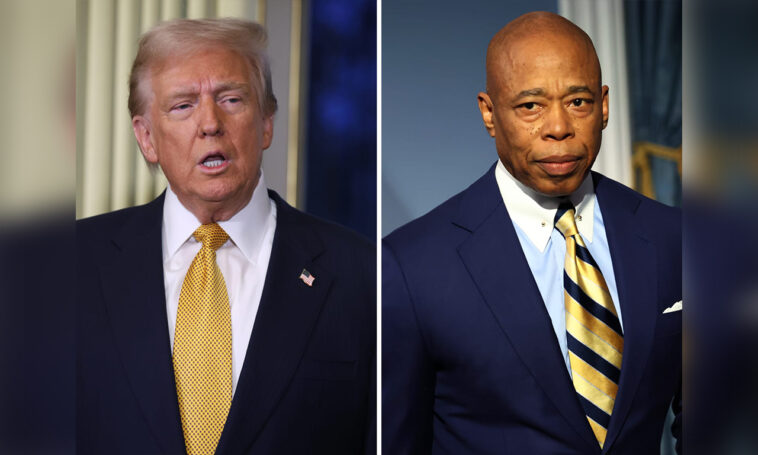During a press conference at his Mar-a-Lago resort in Florida on Monday morning, President-elect Donald Trump was asked about the possibility of pardoning New York City Mayor Eric Adams, who is currently facing federal corruption charges. Trump responded affirmatively, saying, “Yeah, I would,” though he added that he was not fully familiar with the details of the charges Adams is facing. His comments came amid a wider discussion about a range of topics, including the mysterious New Jersey drone incident, vaccines, a CEO’s death, and more. The announcement came shortly after Trump revealed that Japanese tech giant SoftBank Group plans to invest $100 billion in U.S. projects over the next four years.
With Trump set to return to the White House, there has been growing speculation regarding his influence on the political and legal landscape of New York City, particularly when it comes to the embattled mayor. Adams, once a prominent ally of the mayor’s office in New York, has found himself under federal investigation amid allegations of corruption. These charges include accepting luxury travel perks, such as flight upgrades, valued at $100,000, and illegal campaign contributions from a Turkish official and other foreign nationals seeking to gain political influence.
The controversy surrounding Adams is intensifying, especially as members of his administration have come under investigation as well. His legal troubles could prove to be a significant challenge for his political career, further complicating his leadership of the nation’s largest city. Despite these issues, Adams has been vocal about his desire to work with the incoming Trump administration. Shortly after Trump’s election victory, the mayor made clear that he planned to collaborate with the new administration, even signaling a shift in his approach to the migrant crisis that has long plagued New York City. Adams announced the discontinuation of the city’s controversial migrant credit card program, which had sparked debate. The mayor’s office later clarified that this decision was not a response to the election results but rather a response to a decrease in the city’s need for the program.
In a statement to FOX 5 NY, Adams reiterated that New York City would continue to work with the new administration and Congress to develop a more “realistic and compassionate” national strategy for immigration. Despite the ongoing legal and political turmoil, Adams reaffirmed New York City’s commitment to being a “city of immigrants and a beacon of liberty around the globe.”
While Trump has criticized Adams’ handling of the migrant issue, he has also expressed empathy toward the mayor’s legal situation. At the Al Smith Dinner in October, Trump commented on Adams’ legal challenges, comparing them to his own experiences with the New York legal system.
“I just want to be nice because I know what it’s like to be persecuted by the DOJ for speaking out against open borders,” Trump remarked, referring to his own legal battles. “We were persecuted, Eric. I was persecuted, and so were you, Eric.”
Trump’s remarks reflect the shared sense of persecution that both men claim to have faced, though their political alignments and ideologies differ on many issues.Trump also commented on the potential for Adams’ indictment prior to the 2024 election, speculating that Adams’ vocal criticism of the federal government’s handling of the migrant crisis might lead to legal consequences. “I watched about a year ago when [Adams] talked about how the illegal migrants are hurting our city, and the federal government should pay us,” Trump said. “I said, ‘You know what? He’ll be indicted within a year.’ And I was exactly right because that’s what we have.”
Despite these pointed criticisms, Trump has acknowledged Adams’ favorable comments about him in the past. The former president contrasted Adams’ approach to that of former Mayor Bill de Blasio, who Trump frequently criticized as the “worst mayor ever.” Adams’ more pragmatic stance on certain issues, as well as his willingness to work with the Trump administration, has earned him some political capital in the eyes of the former president, even amid his legal challenges.
In a broader sense, this ongoing saga underscores the complexity of political and legal dynamics in the U.S., particularly in New York City, where the relationship between local leadership and federal authority can often be fraught with tension. Both Trump and Adams have weathered political storms in their respective careers, and the unfolding situation could have far-reaching implications for both men, as well as for the future of New York City politics. Despite the controversies surrounding them, their interactions suggest that the personal and political stakes of the moment are intertwined, and the resolution of Adams’ legal issues could influence the trajectory of his mayoralty and Trump’s influence in the region.




Join the Community and Be a Part of the Conversation
You must be logged in or registered to post a comment.